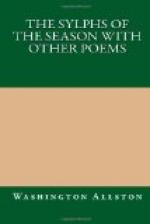Nor wrongly deem the cynick muse aspires,
With monkish tears to quench our nobler fires.
Let honest pride our humble hearts inflame,
First to deserve, ere yet we look to, fame;
Not fame miscall’d, the mob’s applauding
stare;
This monsters have, proportion’d as they’re
rare;
But that sweet praise, the tribute of the good,
For wisdom gain’d, through love of truth pursued.
Coeval with our birth, this pure desire
Was given to lift our grov’ling natures higher,
Till that high praise, by genuine merit wrung
From men’s slow justice, shall employ the tongue
Of yon Supernal Court, from whom may flow
Or bliss eternal or eternal wo.
And since in all this hope exalting lives,
Let virtuous toil improve what Nature gives:
Each in his sphere some glorious palm may gain,
For Heaven all-wise created nought in vain.
Oh, task sublime, to till the human soil
Where fruits immortal crown the lab’ror’s
toil!
Where deathless flowers, in everlasting bloom,
May gales from Heaven with odorous sweets perfume;
Whose fragrance still when man’s last work is
done,
And hoary Time his final course has run,
Thro’ ages back, with fresh’ning power
shall last,
Mark his long track, and linger where he past!
The Paint-Kings.
Fair Ellen was long the delight of the young,
No damsel could with her compare;
Her charms were the theme of the heart and the tongue.
And bards without number in extacies sung,
The beauties of Ellen the fair.
Yet cold was the maid; and tho’ legions advanced,
All drill’d by Ovidean art,
And languish’d, and ogled, protested and danced,
Like shadows they came, and like shadows they glanced
From the hard polish’d ice of her
heart.
Yet still did the heart of fair Ellen implore
A something that could not be found;
Like a sailor she seem’d on a desolate shore,
With nor house, nor a tree, nor a sound but the roar
Of breakers high dashing around.
From object to object still, still would she veer,
Though nothing, alas, could she find;
Like the moon, without atmosphere, brilliant and clear,
Yet doom’d, like the moon, with no being to
cheer
The bright barren waste of her mind.
But rather than sit like a statue so still
When the rain made her mansion a pound,
Up and down would she go, like the sails of a mill,
And pat every stair, like a woodpecker’s bill,
From the tiles of the roof to the ground.
One morn, as the maid from her casement inclin’d,
Pass’d a youth, with
a frame in his hand.
The casement she clos’d—not the eye
of her mind;
For, do all she could, no, she could not be blind;
Still before her she saw the
youth stand.
“Ah, what can he do,” said the languishing
maid,
“Ah, what with that
frame can he do?”
And she knelt to the Goddess of Secrets and pray’d,
When the youth pass’d again, and again he display’d
The frame and a picture to
view.




